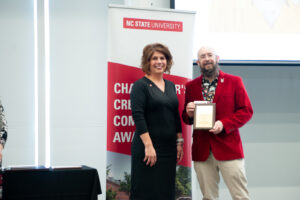
Inclusive Excellence and Strategic Practice (IESP), the educational outreach arm of the Office of Institutional Equity and Diversity (OIED) is proud to present “Creating Community” – a series that shines a spotlight on the exceptional work happening across campus in the areas of inclusion and belonging. We believe that achieving our goals in these areas is the work of everyone, and this series seeks to honor the accomplishments and contributions of the outstanding faculty, staff, students, colleges, student organizations and alumni.
As November comes to a close, we are proud to present our latest Creating Community spotlight—integration and application development specialist for NC State Libraries Troy Hurteau.
Hurteau was a distinguished recipient of the 2023 Chancellor’s Creating Community Award. This award is presented at the annual Recognizing Excellence in Diversity (RED) Event hosted by the Office for Institutional Equity and Diversity (OIED). The 2023 event saw 35 nominees, with six being award recipients.
We sat with Hurteau to hear more about his commitment to enhancing and fostering diversity, equity and inclusion and what this recognition means to him.
Can you share a bit about your background and how you got involved with the Libraries’ Equity, Diversity, and Inclusion Committee?
I began my journey here at NC State as a Computer Science student. I initially began working for the IT department for the College of Engineering where I gained valuable knowledge on accessibility.
Upon moving to the Libraries, I became more involved with what was called the Diversity Committee at the time. We have an extremely robust committee structure in the Libraries and have recently formed a separate accessibility committee. In a recent project, I had the opportunity to contribute to the Innovation Studio, a platform highlighting student research. It was a good opportunity to expand beyond electronic IT web accessibility and delve into the realm of physical accessibility and its integration into the overall user experience.
What is now known as the Libraries Equity, Diversity, and Inclusion (EDI) Committee has certainly grown since I first started. It initially focused heavily on event planning and dealt with surface-level diversity aspects. Since my return to the committee, we have shifted our discussions into more profound topics like anti-racism and privilege. While we continue to create opportunities for conversations across diverse perspectives, the committee has undoubtedly deepened its engagement in these crucial areas.
What DEI program/initiative or accomplishment were you recognized for? What long-term impacts do you hope this work will have on the community?

One of the initiatives mentioned in the nomination is the staff reading group. The reading circle emerged as a new initiative, providing a unique format for engagement. Participants would read a selected book, and we would structure the discussions over three to four sessions. This spaced-out approach allowed for a more thorough exploration of different aspects of the books. The response has been positive, with participants appreciating the opportunity to create community. Before the pandemic, we expanded into Hunt Library, so we had staff across two different buildings and campuses. The reading circle is just one way we have been able to bring people together, fostering a sense of community and facilitating the exchange of perspectives.
Additionally, we initiated the Heritage Book Displays program, which explores the various history and heritage months. If a specific month lacks a nationally organized theme, we dive into alternative topics such as mental health. Our process involves gathering a range of ideas and recommendations, followed by a careful selection to ensure different perspectives are being represented in the displays. Students have enjoyed these displays as it’s been a way for them to see themselves, as well as learn about others’ perspectives.
We’re actively striving to enhance well-being and foster a sense of belonging within the organization, and we believe that these initiatives provide a valuable opportunity for achieving this goal.
What did your work and recognition through the Creating Community Award mean to you?
It was exciting being able to witness some of the collaborative efforts I’m involved with receive recognition. However, what truly excited me was learning about the initiatives others across the university are undertaking. Oftentimes, the work can feel very isolated when you’re on a committee with just a few people. Seeing a broader community engaging in other exciting programs is extremely energizing.
What advice would you share with others who’d like to have a DEI impact but are finding it challenging?
For me, the biggest thing is cultivating curiosity. Recently, I’ve gotten more into reading. Early in my career, my reading consisted of learning a new programming language or learning a new technology. Participating in book clubs and exploring non-fiction books that I may not read on my own has allowed me to discover new things. The diverse perspectives offered by these different authors contribute to many of the valuable insights I’ve gained.
Are you a past winner of a CCC Award who would like to be featured? If so, fill out this brief form or email inclusive-excellence@ncsu.edu.